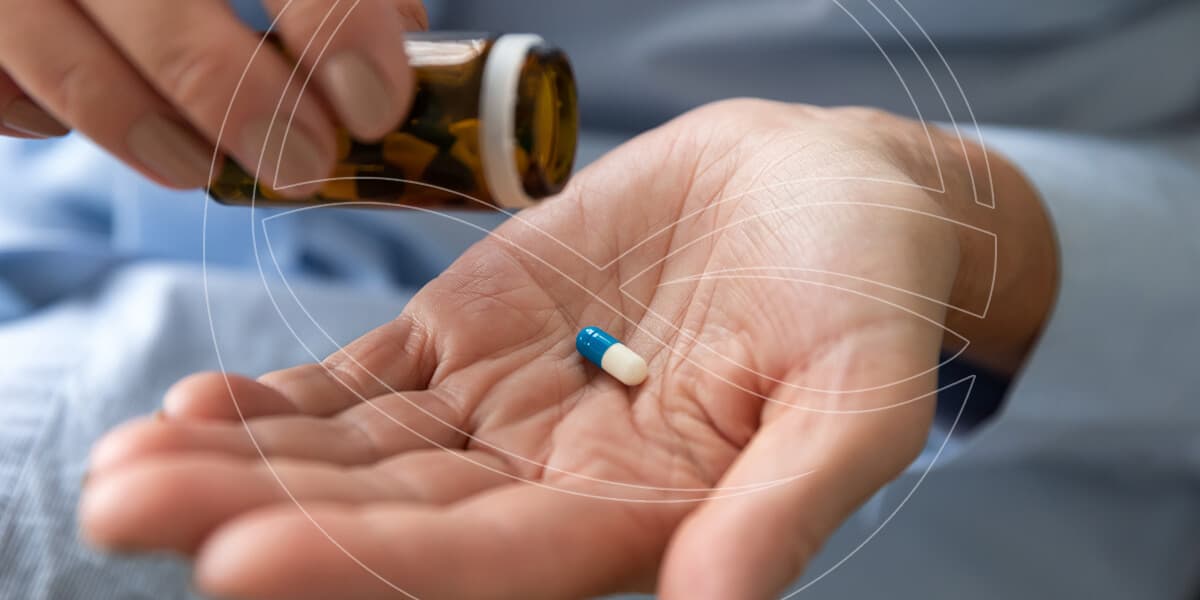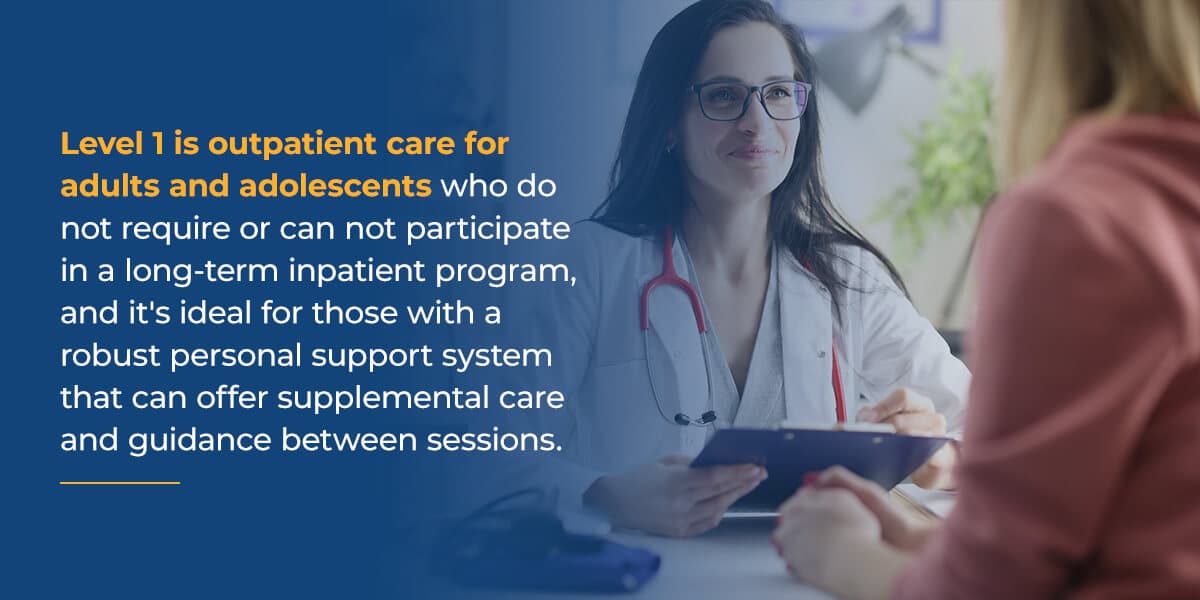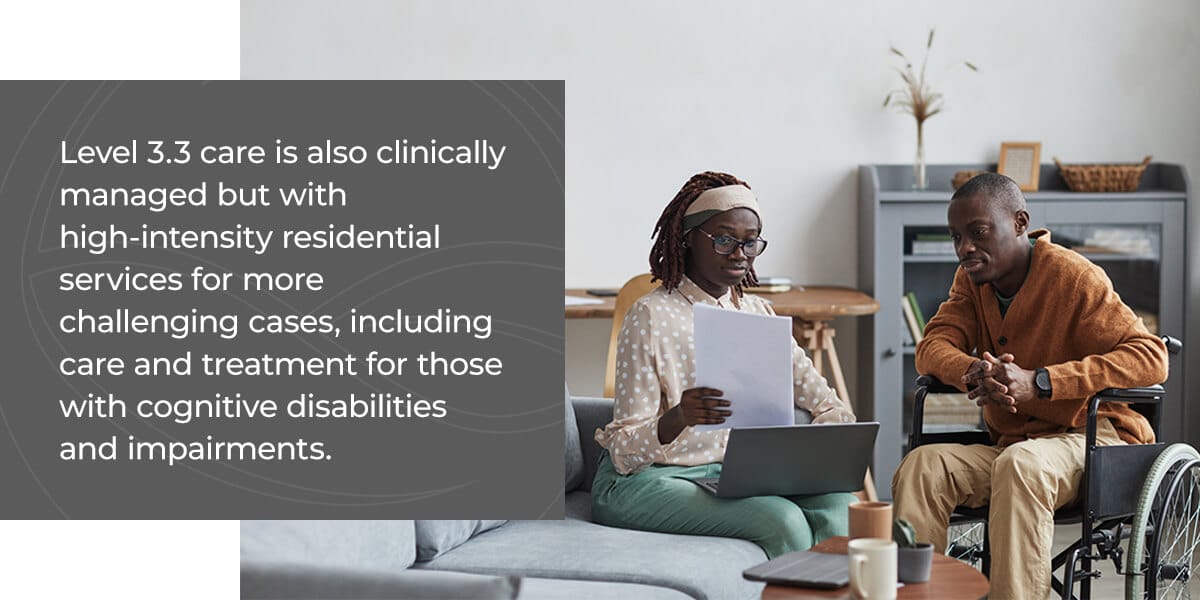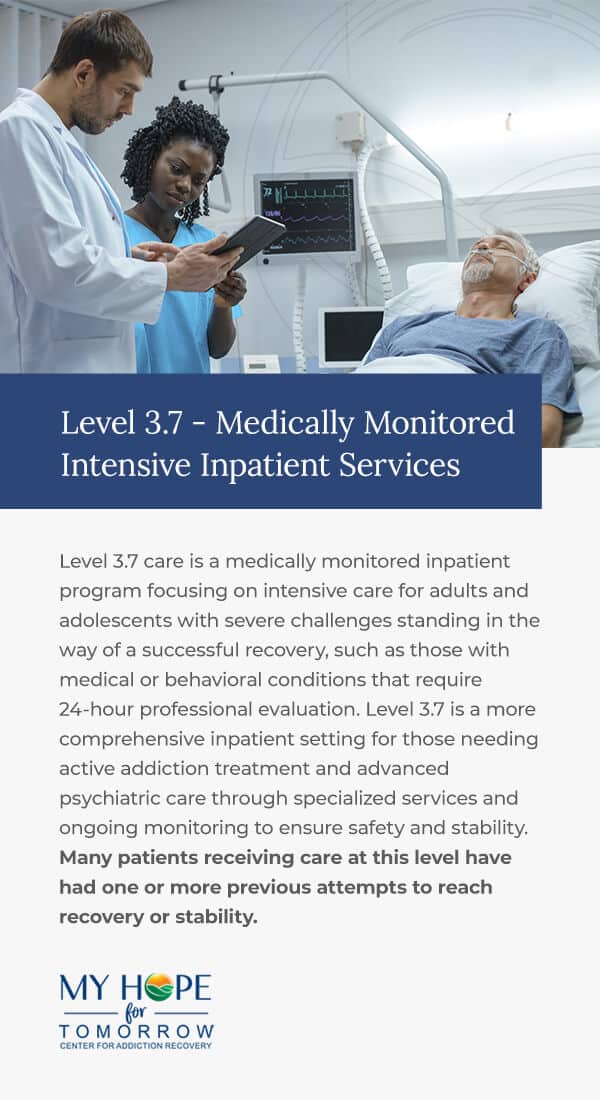

Many inpatient and outpatient substance use disorder (SUD) treatment facilities and individual physicians use the American Society of Addiction Medicine’s (ASAM) continuum of care standards to place individuals at an appropriate care level for their needs. The five treatment levels of care for substance abuse treatment are:
Those with SUD can also refer to these levels for a better understanding of their specific needs and what long-term recovery could look like for them.
The basic function of care level-based treatment is to match you with the best possible treatment plan for your specific needs, and that requires a holistic view of your history, current circumstances, relationship with the substance, potential hindrances and more.
The ASAM standards create a simple framework for evaluating and treating people with SUD by establishing different dimensions of assessment to match individuals with the best level of care for their unique needs. Substance use disorder care levels make it easier to communicate progress and needs between the individual and their provider, as well as any external parties like non-addiction health care providers and insurance companies determining coverage options. Several states have also started using the ASAM criteria as a foundation for addiction treatment systems.
Every level offers a different type of care at varying intensities, and individuals can enter the program at any level, depending on their immediate situation, overall needs and professional assessment and evaluation results. They then progress to a lower or higher care level as needed. Some people thrive after participating in all addiction treatment levels of care, while some only need one level to reset. There is no “good” or “bad” level — each stage simply represents a different approach to care based on the individual’s most pressing challenges.
Care levels start at 0.5, and the highest care offered is level 4. Not every facility or treatment center offers care for each level, instead focusing efforts on some of the most critical or relevant for individuals in that area. Hope for Tomorrow provides care for individuals with SUD at all stages of levels 1, 2 and 3.
An intake professional will administer the ASAM assessment in one of several ways, depending on the facility, your needs and the provider’s preference. The ASAM Continuum™ is a computer-based tool that lets clinicians guide you through a multidimensional assessment that takes about an hour to complete. By the end, you and your clinician will have a better idea of treatment priorities and recommendations, including the lowest possible level of care suitable for your needs.
Other assessment options include a paper version and the ASAM Co-Triage Assessment™ — an abbreviated version that narrows the assessment into six minutes’ worth of key questions.
Regardless of format, the assessment considers different factors of your treatment and recovery that fall into six dimensions:
Your intake clinician will also incorporate any feedback or concerns you have, as well as any prescription medications you currently take, the self-described intensity of your situation and what types of therapy might prove most beneficial at your current state.
Level 0.5 is the prevention and early intervention stage. It works to educate, counsel and provide preventive resources for adults and adolescents who show signs or symptoms of substance misuse — such as using a substance as a coping mechanism or in a way that harms their health or goals — but doesn’t currently meet the Diagnostic and Statistic Manual of Mental Disorders (DSM-5) criteria for a SUD.

Level 1 is outpatient care for adults and adolescents who do not require or can not participate in a long-term inpatient program, and it’s ideal for those with a robust personal support system that can offer supplemental care and guidance between sessions.
These sessions take place at a health care provider’s office via trained clinicians or professionals educated in SUD management and counseling. Some treatment centers also offer nonresidential outpatient care. Programs are nine hours or less weekly for adults and six hours or less for adolescents.
Level 1 outpatient care involves one or more of the following:
Level 2 includes two types of care and management — intensive outpatient and partial hospitalization. Both involve some level of outpatient care and are not the same as residential treatment, though some therapies or treatments may overlap or share similarities.
Level 2.1 is intensive outpatient treatment (IOT) services for adults and adolescents with needs too great for standard outpatient treatment or those who lack the resources or support to maintain outpatient progress between sessions. Services include nine or more hours per adult each week and six or more hours for adolescents each week, with hours typically varying between daytime, evening or weekend attendance. Individuals in an IOT program for SUD are generally recommended to participate for at least 90 days before reevaluation.
Intensive outpatient services might involve:
Intensive outpatient services can take place at any provider’s office or at a treatment center with nonresidential options as long as the practitioner overseeing the program meets all state and licensing criteria.
Level 2.5 involves partial hospitalization in addition to outpatient services. Total care equals 20 or more hours weekly, and the program’s overall duration ranges from two to six weeks, depending on the individual’s needs and progress. Individuals might be better suited for this level of care — instead of level 2.1 or level 3 care — if they:
Individuals in level 3 care participate in either clinically managed low-intensity residential services, high-intensity residential services, population-specific high-intensity residential services or medically monitored intensive inpatient services.
Level 3.1 offers clinically managed low-intensity residential services for individuals with SUD whose needs exceed the care provided at levels 1 and 2. The program includes at least five hours of weekly clinical service and access to professionals who can provide around-the-clock care, medication administration and other tasks as needed.
A level 3.1 patient might participate in one or more of the following:
Level 3.1 care ultimately focuses on helping individuals with SUD build skills, confidence and stability until they can transfer to a lower level of care.

Level 3.3 care is also clinically managed but with high-intensity residential services for more challenging cases, including care and treatment for those with cognitive disabilities and impairments. While level 3.1 focuses a lot on community support and social skills, adults receiving level 3.3 care need 24-hour residential support that meets their specific physical and mental needs, including access to specially trained physicians.
These individuals are generally medically stable but need high-intensity support to overcome the additional challenges created by a temporary or permanent cognitive impairment, such as substance-induced impairments or neurological disorders. Depending on the individual’s condition, progress and stability, they might also participate in one or more of the programs offered at level 3.1.
Level 3.5 offers similar 24-hour high-intensity residential services under clinical management as levels 3.1 and 3.3, but it’s for adults and adolescents who need imminent stabilization before they’re eligible to move to a lower level of care or enter an outpatient treatment program. It incorporates full group therapy to help individuals build and strengthen skills to transition to a new lifestyle that prioritizes recovery and stability and avoids triggering or toxic lifestyles and habits for long-term success.
Level 3.5 patients rely on the residential structure for initial supervision and structure that helps them bridge the initial challenges of sobriety.

Level 3.7 care is a medically monitored inpatient program focusing on intensive care for adults and adolescents with severe challenges standing in the way of a successful recovery, such as those with medical or behavioral conditions that require 24-hour professional evaluation. Level 3.7 is a more comprehensive inpatient setting for those needing active addiction treatment and advanced psychiatric care through specialized services and ongoing monitoring to ensure safety and stability. Many patients receiving care at this level have had one or more previous attempts to reach recovery or stability.
All 3.7 care facilities have on-site psychiatric services available as needed, and these services are often a required part of the treatment program. Treatment might involve a combination of psychosocial therapy, pharmacotherapy and daily clinical services from a trained treatment team that includes medical and behavioral health professionals.
All patients undergo a custom-fit plan that meets their specific needs, challenges and histories. Clinicians work together with the patient to create this plan and incorporate goals and activities that reflect the individual’s strengths, struggles and goals. Treatment plans are often sectioned into measurable goals that support long-term objectives to foster a sense of accomplishment and visible success.
Level 3.7 care often includes:
Some states require all level 3.7 care programs to be overseen by a medical director who is also a physician certified in addiction medicine or an addiction psychiatrist.
Level 4 care is a 24-hour medically managed intensive inpatient service commonly referred to as “detoxification” or “detox.” It’s for individuals who need physician care as they undergo withdrawal symptoms or symptoms of active intoxication. It’s a complex form of care requiring around-the-clock monitoring and professional assistance for cognitive, emotional, medical and behavioral concerns. Part of the services includes access to available counseling for at least 16 hours daily.
Individuals receiving care at level 4 might successfully transition to a level 3 program if deemed appropriate by their care team and personal goals.
Hope for Tomorrow offers care for levels 1 through 3.7, complete with medication-assisted treatment, 12-step support, smart recovery plans and a specialized case management team. Individuals also benefit from on-site activities and amenities like a gym and morning meditation to reach balance and find inner stability as they work toward a substance-free life.
Please call 304-857-6494 to speak with an admissions specialist, or learn more about program options today.

At Hope for Addiction, we provide comprehensive residential treatment for drug use in Point Pleasant, West Virginia. Our team has experience in clinical training, and we have been where you are in wanting to recover from the disease of addiction. Call us at 877-679-9162 today.